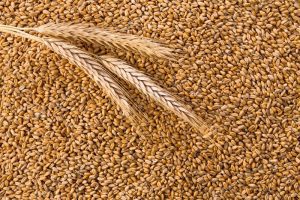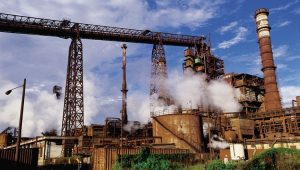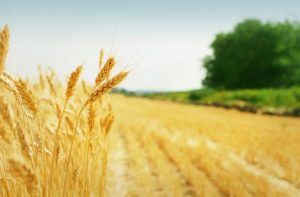
As of November 30, Ukrainian agricultural producers harvested 80.9 million tonnes of basic crops from an area of 23.8 million hectares, in particular, 62.5 million tonnes of grain and leguminous crops were harvested from an area of about 15 million hectares (98% of the forecast).
According to a report on the website of the Ministry of Economy, the following crops were harvested: corn – 26.8 million tonnes from an area of 5.1 million hectares (94%), soybeans – 2.8 million tonnes from 1.3 million hectares (99%), sugar beet – 9 million tonnes from an area of 212,200 hectares (98%).

President of Ukraine expects Clean Environment Office in Kryvy Rih to be ready this year
President of Ukraine Volodymyr Zelensky expects the readiness of the Clean Environment Office of the State Environmental Inspectorate in Kryvy Rih, Dnipropetrovsk region by the end of 2020, according to the department’s website with reference to its Head Andriy Maliovany.
“The head of state said he expects a real and visible result in solving the environmental problems of Kryvy Rih. This is about the opening of the Clean Environment Office of the State Environmental Inspectorate to strengthen environmental control over industrial facilities. He added that the preparation of the office before opening should be finished by the end of the year. For my part, I would like to say that this task is being carried out on schedule,” Maliovany said after a meeting with the participation of the president of Ukraine on the prospects for the development of the region.
According to him, at present, the internal repairs in the premises allocated for the office are already at the final stage. “Agreements have been signed to provide the office with necessary equipment. And by the end of the year the office will be ready for opening, and employees of the central office are planned to move there in early 2021,” Maliovany said.
According to the head of the State Environmental Inspectorate, the president also said that on his instructions, the State Environmental Inspectorate’s needs will be financed in 2021 in terms of paying court fees, organizing market supervision and ensuring the work of laboratories for 2021.
During the meeting, Maliovany also told about the voluntary payment of losses for air emissions by the enterprise of PJSC ArcelorMittal Kryvyi Rih. “Recently, the State Environmental Inspectorate counted millions of losses of PJSC ArcelorMittal Kryvyi Rih, which the company paid in full on a voluntary basis,” he said.

Ambassador of Ukraine to Australia Mykola Kulinich held a number of meetings in Melbourne, the purpose of which is to expand the Ukrainian-Australian cooperation in the trade and economic sphere, the press service of the Ukrainian Embassy in Australia said.
“The meeting with President of the Australian-Ukrainian Chamber of Commerce Eugene Hawryszko was devoted to the discussion of the prospects for increasing trade between the two countries, the possibility of entering the Australian market for new types of Ukrainian products, as well as the establishment of joint ventures,” the statement says.
In addition, according to the press service of the embassy, during a meeting with head of the Australian-Ukrainian Business Council J. Epp, they discussed attracting Australian investments and technologies to Ukraine, as well as further organizational restructuring of the business council.

The deficit of Ukraine’s foreign trade in goods in January-November 2020 halved compared to the same period in 2019, to $3.93 billion from $8.15 billion, in November the foreign trade deficit amounted to $590 million compared to $360 million in deficit in October and $860 million in deficit in November last year. According to the data of the State Customs Service, export of goods from Ukraine for the specified period compared to the same period in 2019 decreased by 3.51%, to $44.45 billion, import by 10.77%, to $48.38 billion.
The State Customs Service clarified that in November this year, compared with October, the volume of exports increased by 2.21%, to $4.73 billion, imports by 6.75%, to $5.32 billion.
At the same time, compared to November 2019, exports increased by 9.15%, imports by 2.43% in monetary terms.
According to the customs data, China remains the largest trade partner of Ukraine in January-November with a trade turnover of $43.9 billion, a deficit of almost $15.6 billion. It is followed by the Russian Federation (a turnover of $39.7 billion, a negative balance of $12.97 billion) and Germany (trade turnover is $28.3 billion, a deficit of $11.86 billion), according to the State Customs Service.

Owner of Novus Ukraine LLC, Consul Trade House UAB, has completed a deal with Rewe International AGo to acquire a 100% stake in the authorized capital of Billa-Ukraine, a foreign investment enterprise, which is developing the Billa supermarket chain in Ukraine.
“We have passed a decisive stage and completed the acquisition of the Billa network. At the moment, we have the opportunity to officially begin fruitful work for the merger,” Novus CEO Mark Petkevich is quoted in a press release.
Novus COO Oleksiy Panasenko also added that the store opening hours will not change. In addition, Novus Ukraine LLC and Billa Ukraine foreign investment enterprise will continue to operate as usual, fulfilling previously reached contractual obligations to partners and counterparties.

The Ukrainian Chambers of Commerce and Industry and export organizations assess the opportunities for the export of Ukrainian products on a 10-point scale at 7.5, and note the need for state support for export activities, which should provide for financial, legal, communication and infrastructure direction.
According to the research “Analysis of institutional support for exports among organizations of the agrarian sector of Ukraine” of the Agritrade Ukraine project, the text of which is available to the Interfax-Ukraine agency, the average assessment of the opportunities for the export of Ukrainian products on a 10-point scale (where one is very poor opportunities, while ten is very good) by participants in the study was 7.5.
Among the main factors of such an assessment were named a high existing demand abroad, good qualifications and experience of industry employees, favorable agro-climatic conditions.
At the same time, the participants in the research noted that the implementation of the export potential is impossible in full due to a saturated competitive environment, insufficient level of harmonization of production and processing standards, the complexity and lack of information about the features of certification and the inertia of some domestic farmers.
More than three quarters of the organizations (77%) that that took part in the survey noted that they have established cooperation with companies from the EU countries. Among the main problems that arise in this process and become obstacles to cooperation, they named a small amount of quotas for certain types of agricultural products, non-compliance with quality standards and certification standards, a saturated competitive environment.
Assessing the compliance of domestic agricultural products and food products with European quality standards, almost three quarters of the respondents (72%) noted that they were more likely to comply, 12% of the survey participants were sure of absolute compliance.
Approximately one fifth of the organizations (22%) that took part in the survey can fully satisfy the requests of Ukrainian companies to establish trade relations with foreign companies and companies from the EU countries (that is, 90-100% of requests).
Among the main factors that affect the ability to satisfy the requests of Ukrainian companies to establish trade relations with foreign companies and companies from the EU countries, the survey participants most often named a lack of practical experience of employees, a lack of knowledge of business English and export-import legal framework, a limited access to market information (supply-demand), lack of analytical skills and tools, the volume of quotas for the export of certain types of agricultural products, limited and insufficient advertising and marketing budgets.